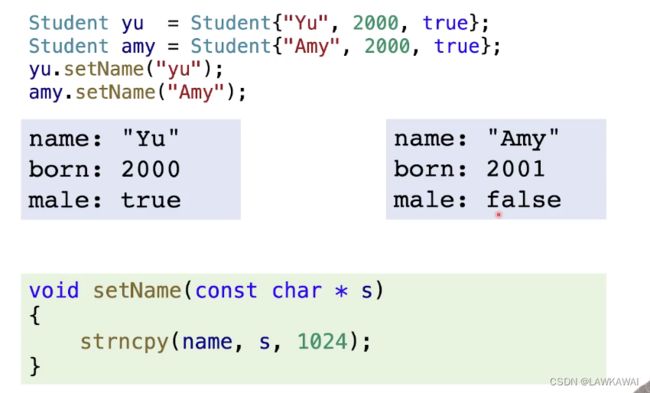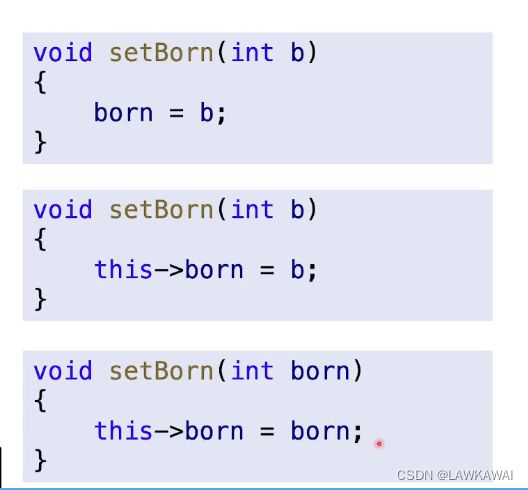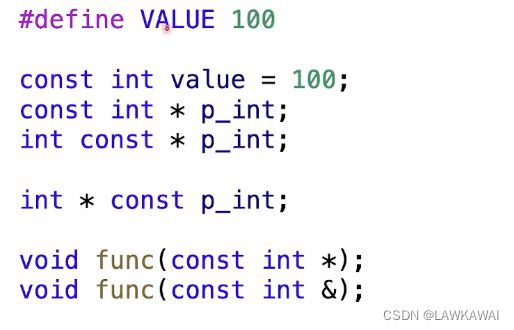【CPP】类和对象
1- Classes and Objects
Structures
- A struct in C is a type consisting of a sequence of data members
- Some functions/Statements are needed to operate the data members of an object of a struct type
不不小心操作错误,不小心越界
Classes
- You should be very careful to manipulated the data members in a struct object
- Can we improve struct to a better one ?
- Yes, it is
class! We can put some member functions in it
class Student
{
private:
static size_t student_total; // declaration only
//inline static size_t student_total = 0; //C++17, definition outside isn't needed
char * name;
int born;
bool male;
void setName(const char * s)
{
strncpy(name, s, sizeof(name));
}
};
Student yu;
yu.setName("Yu");
firstclass.cpp
#include Name: Yu
Born in 2001
Gender: Male
It's name is Yu
Access Specifiers
- You can protect data members by access specifier
private - Then data member can only be accessed by well designed member functions
access_attribute.cpp
#include access-attribute.cpp:37:8: error: 'born' is a private member of 'Student'
yu.born = 2001; // you cannot access a private member
^
access-attribute.cpp:8:9: note: declared private here
int born;
^
Member Functions
- A member function can be defined inside or outside class
- 如果在类内部实现函数则就是
inline函数
function.cpp
#include Name: Yu
Born in 2000
Gender: Male
File Structures
- The source code can be placed into multiple files
student.hpp
#pragma once
#include student.cpp
#include 如果include <> 从编译器路径查找,如果是include "" 从编译器和当前目录找
main.cpp
#include "student.hpp"
int main()
{
Student yu;
yu.setName("Yu");
yu.setBorn(2000);
yu.setGender(true);
yu.printInfo();
return 0;
}
CMakeList.txt
cmake_minimum_required(VERSION 3.12)
project(persondemo)
ADD_EXECUTABLE(persondemo main.cpp student.cpp)
cd multi-files
mkdir build
cd build
cmake ..
make
./persondemo
Name: Yu
Born in 2000
Gender: Male
2-Constructors and Destructors
Constructors
- Different from
structin C, a constructor will be invoked when creating an object of aclass
(1) struct in C: allocate memory
(2) class in C++: allocate memory & invoke a constructor
- But, No constructor is defined explicitly in previous examples
(1) the compiler wil generate one with empty body
如果没有人为定义构造函数,则自动会有一个空的构造函数
- The same name with the class
- Have no return value
class Student
{
private:
char name[4];
int born;
bool male;
public:
Student()
{
name[0] = 0;
born = 0;
male = false;
cout << "Constructor: Person()" << endl;
}
}
Student(const char * initName, int initBorn, bool isMale)
{
setName(initName);
born = initBorn;
male = isMale;
cout << "Constructor: Person(const char, int , bool)" << endl;
}
}
- The members can also be initialized as follows
Student(const char * initName): born(0), male(true)
{
setName(initName);
cout << "Constructor: Person(const char*)" << endl;
}
把成员变量born 初始化为0 , 把male 初始化为true
constructor.cpp
#include Constructor: Person()
Name:
Born in 0
Gender: Female
Name: Yu
Born in 2000
Gender: Male
Constructor: Person(const char*)
Name: li
Born in 0
Gender: Male
Constructor: Person(const char, int , bool)
Name: XueQ�
Born in 1962
Gender: Male
Constructor: Person(const char, int , bool)
Name: Zhou�
Born in 1991
Gender: Female
Destructors
- The destructor will be invoked when the object is destroyed
- Be formed from the class name preceded by a tilde(~)
- Have no return value, no parameters
~Student()
{
cout << "To destroy object: " << name << endl;
delete [] name;
}
析构函数只能有一个
析构函数常做的事情:释放内存,关闭文件,断掉网络etc
destructor.cpp
#include g++ destructor.cpp --std=c++11
Constructor: Person()
Name:
Born in 0
Gender: Female
Name: Yu
Born in 2000
Gender: Male
To destroy object: Yu
Constructor: Person(const char, int , bool)
Name: XueQikun
Born in 1962
Gender: Male
Constructor: Person(const char, int , bool)
Name: Zhou
Born in 1991
Gender: Female
To destroy object: Zhou
To destroy object: XueQikun
人工手动调用析构函数 delete zhou,作用域结束跳出也会自动调用析构函数
如果对于new 的对象不进行手动删除delete 则作用域结束也不会动态调用析构函数,造成内存泄漏
Student * class1 = new Student[3]{
{"Tom", 2000, true},
{"Bob", 2001, true},
{"Amy", 2002, false},
};
- What is the different between the following two lines?
delete class1;
delete [] class1;
array.cpp
#include Constructor: Person(const char, int , bool)
Constructor: Person(const char, int , bool)
Constructor: Person(const char, int , bool)
Name: Bob
Born in 2001
Gender: Male
To destroy object: Tom
数组调用析构函数delete class1 , 只会调用第一个对象的析构函数,后面的对象不会被调用
数组调用析构函数 delete [] class1,则会调用全部对象的析构函数
Constructor: Person(const char, int , bool)
Constructor: Person(const char, int , bool)
Constructor: Person(const char, int , bool)
Name: Bob
Born in 2001
Gender: Male
To destroy object: Amy
To destroy object: Bob
To destroy object: Tom
3-this pointer
Why is this needed
- How does a member function know which name?
this Pointer
- All methods in a function have a
thispointer - It is set to the address of the object that invokes the method
this.cpp
#include Constructor: Person(const char, int , bool)
Constructor: Person(const char, int , bool)
Constructor: Person(const char, int , bool)
Name: Bob
Born in 2001
Gender: Male
To destroy object: Amy
To destroy object: Bob
To destroy object: Tom
4- const and static Members
const Variables
- statements for constants
C++不推荐用 宏
const Members
constmember variables behavior similar with normal const variablesconstmember functions promise not to modify member variables
class Student
{
private:
const int BMI = 24;
public:
Student()
{
BMI = 25;//can it be modified?
int getBorn() const
{
born++; //Can it be modified?
return born;
}
};
常量函数,const 放在后面,不然跟前面的const int相冲突。不可以修改成员变量,born 是不可以被修改的,保证不修改函数里的变量
const.cpp
#include Constructor: Person(const char, int , bool)
yu.getBorn() = 2000
To destroy object: Yu
static members
staticmembers are not bound to class instances
class Student
{
private:
static size_t student_total; // declaration only
public:
Student()
{
student_total++;
}
~Student()
{
student_total--;
}
static size_t getTotal() {return student_total;}
};
// definition it here
size_t Student::student_total = 0;
静态成员不绑定在类对象上,只有一个
static.cpp
#include ---We have 0 students---
Constructor: Person(const char, int , bool): student_total = 1
Constructor: Person(const char, int , bool): student_total = 2
Constructor: Person(const char, int , bool): student_total = 3
---We have 3 students---
Constructor: Person(const char, int , bool): student_total = 4
---We have 4 students---
Name: Bob
Born in 2001
Gender: Male
To destroy object: Amy. Then 3 students are left
To destroy object: Bob. Then 2 students are left
To destroy object: Tom. Then 1 students are left
---We have 1 students---
To destroy object: Yu. Then 0 students are left
静态函数里面不可以修改非静态数据



